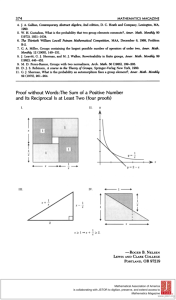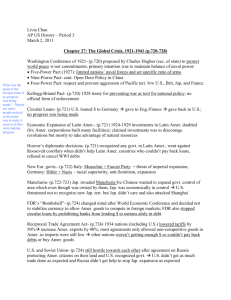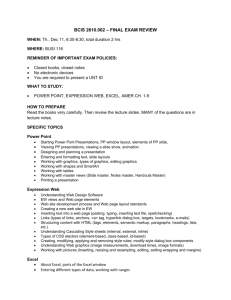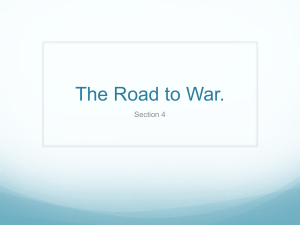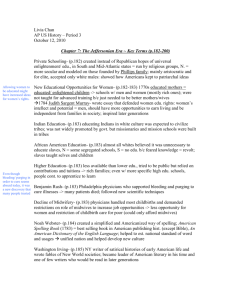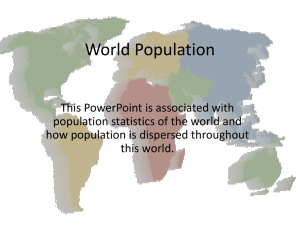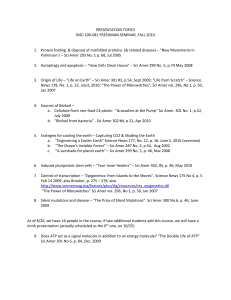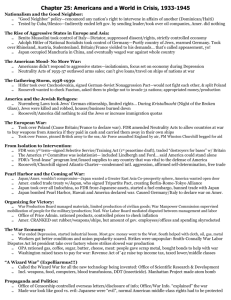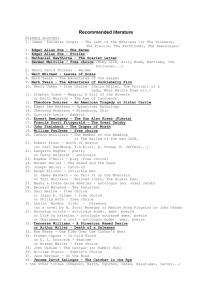Chapter 8 Outline America Secedes from the Empire, 1775-1783
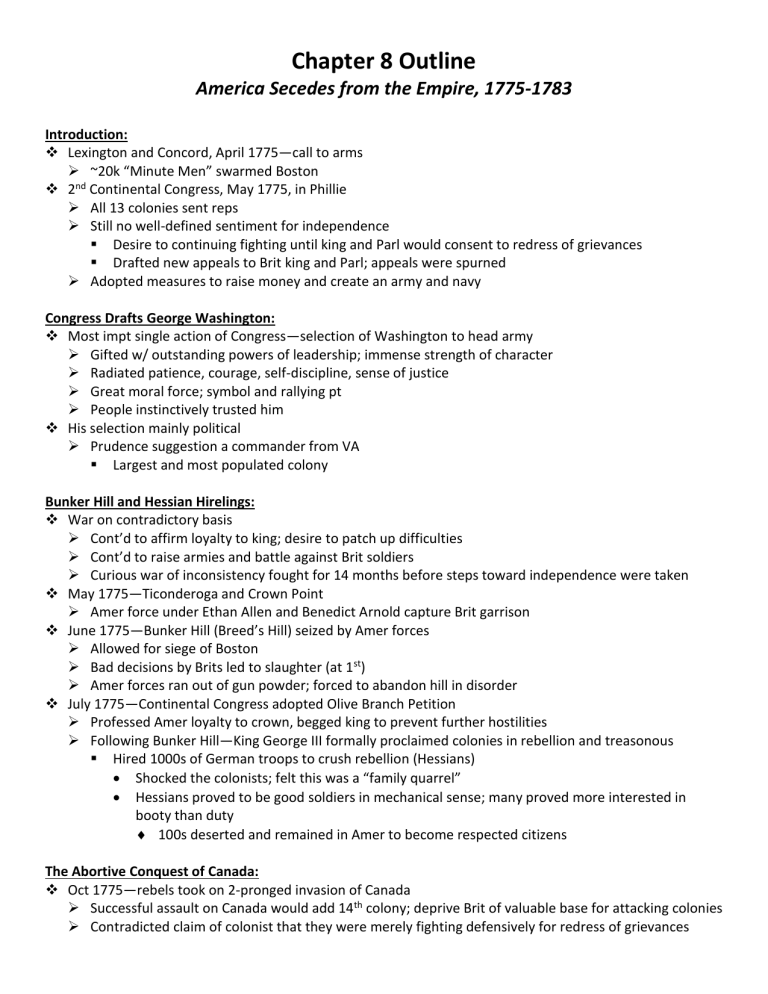
Chapter 8 Outline
America Secedes from the Empire, 1775-1783
Introduction:
Lexington and Concord, April 1775—call to arms
~20k “Minute Men” swarmed Boston
2 nd Continental Congress, May 1775, in Phillie
All 13 colonies sent reps
Still no well-defined sentiment for independence
Desire to continuing fighting until king and Parl would consent to redress of grievances
Drafted new appeals to Brit king and Parl; appeals were spurned
Adopted measures to raise money and create an army and navy
Congress Drafts George Washington:
Most impt single action of Congress—selection of Washington to head army
Gifted w/ outstanding powers of leadership; immense strength of character
Radiated patience, courage, self-discipline, sense of justice
Great moral force; symbol and rallying pt
People instinctively trusted him
His selection mainly political
Prudence suggestion a commander from VA
Largest and most populated colony
Bunker Hill and Hessian Hirelings:
War on contradictory basis
Cont’d to affirm loyalty to king; desire to patch up difficulties
Cont’d to raise armies and battle against Brit soldiers
Curious war of inconsistency fought for 14 months before steps toward independence were taken
May 1775—Ticonderoga and Crown Point
Amer force under Ethan Allen and Benedict Arnold capture Brit garrison
June 1775—Bunker Hill (Breed’s Hill) seized by Amer forces
Allowed for siege of Boston
Bad decisions by Brits led to slaughter (at 1 st )
Amer forces ran out of gun powder; forced to abandon hill in disorder
July 1775—Continental Congress adopted Olive Branch Petition
Professed Amer loyalty to crown, begged king to prevent further hostilities
Following Bunker Hill—King George III formally proclaimed colonies in rebellion and treasonous
Hired 1000s of German troops to crush rebellion (Hessians)
Shocked the colonists; felt this was a “family quarrel”
Hessians proved to be good soldiers in mechanical sense; many proved more interested in booty than duty
100s deserted and remained in Amer to become respected citizens
The Abortive Conquest of Canada:
Oct 1775—rebels took on 2-pronged invasion of Canada
Successful assault on Canada would add 14 th colony; deprive Brit of valuable base for attacking colonies
Contradicted claim of colonist that they were merely fighting defensively for redress of grievances
Invasion of Canada narrowly missed success
Montreal captured; Montgomery killed, B Arnold forced to retreat
French Canadians not eager to help anti-Cath invaders
Jan 1776—Brits burn Norfolk, VA
March 1776—Brits forced to evacuate Boston
Evacuation Day still celebrated annually
Feb 1776—rebels defeat loyalists at Moore’s Creek Bridge in NC
June 1776—revels defeat invading Brit fleet at Charleston harbor
Thomas Paine Preaches Common Sense:
Loyalty to GB deeply ingrained
Many Amers considered themselves part of trans-Atlantic community
Colonial unity was poor
Open rebellion dangerous, esp vs formidable Brit forces
Opinions began changing more after burning of Falmouth and Norfolk, hiring of Hessians
1776—publication of Common Sense by Thomas Paine
One of most influential pamphlets ever written
Began w/ treatise on nature of govt; enticipated Jefferson’s declaration
Only lawful states were those that derive “their just powers from the consent of the governed”
As for the king, whom Amers professed to revere, he was nothing but “the Royal Brute of Great Brit”
120,000 copies sold
Convinced many their true cause was independence
Pointed out w/o indep Amer could not hope for foreign assistance
Paine and the Idea of “Republicanism”:
Common Sense not only called for indep, but for creation of new kind of pol society
A republic—power flowed from the people themselves
All govt officials derive auth from popular consent
Republicanism appealed to those Brit politicians critical of excessive power in hands of the king and his advisors
Their writings found responsive audience in Amer
Interpreted vengeful royal acts as part of monarchical conspiracy to strip liberties of Brit subjects
Paine’s radical prescription—reject monarchy and empire; embrace an indep republic
Colonists’ experience w/ governance prepared them well for Paine’s call to create a republic
Practiced a kind of republicanism already (esp in NE)
Town mtgs, annual elections, popularly elected committees of correspondence
Absence of hereditary aristocracy; relative equality of condition of landowning farmers
Most Amer considered citizen “virtue” essential to successful rep govt
Indiv needed to sacrifice personal self-interest to public good
Collective good of “the people” mattered more than private rts and interests of indivs
Some Patriots did not agree w/ Paine’s approach to republicanism
Favored rep ruled by a “natural aristocracy” of talent
Feared fervor for liberty would overwhelm stability of social order
Jefferson’s “Explanation” of Independence:
June 7, 1776—Richard Henry Lee of VA moved that “these United Colonies are, and of right ought to be, free and independent states”
Motion adopted on July 2 nd
Formal declaration of indep by Amer colonies
A break of this kind called for a formal explanation
Emotional appeal needed to enlist other Brit colonies in the Amers to invite assistance from foreign nations and rally resistance at home
Thomas Jefferson given task of drafting formal stmt of separation
Recog as brilliant writer
Declaration of Independence formally approved on July 4 th
Gave his appeal universality by invoking “natural rights” of mankind; not just Brit rts
Argued colonists were justified in cutting connection
Long list of presumably tyrannous misdeeds of King George III
Imposing taxes w/o consent
Dispensing w/ trial by jury
Abolishing valued laws
Est mil dictatorship
Maintaining standing armies in peacetime
Cutting off trade
Burning towns
Hiring mercenaries
Inciting hostilities among the Indians
“The world’s greatest editorial”
W/ formal decl or indep, foreign assistance could now be solicited w/ greater hope of success
Decl of Indep became source of inspiration to countless revolutionary mvmts against arbitrary auth
i.e. Decl of the Rights of Man in Fr Rev
Patriots and Loyalists:
Amer rebels—Patriots
Also called “Whigs” after oppos factions in Brit
Most numerous in areas where Presbyterianism and Congregationalism flourished
New England esp
Colonials loyal to king—Loyalists
Also called “Tories” after dominant pol party in Brit
“A Tory is a thing whose head is in Eng, and its body in Amer, and its neck ought to be stretched”
~16% of Amer pop
Many were people of educ and wealth, of culture and caution
More numerous among older generation
Included the king’s officers and other beneficiaries of the crown
Typically most numerous where Anglican Church was strongest
Notable exception—VA
Also found in aristocratic NYC and Charleston; Quaker Penns and NJ
Rev mvmt was minority mvmt
Most Amers were apathetic or neutral
Opposing forces not only contended against one another but also for allegiance and support of civilian pop
Brit mil proved only able to control areas where it could maintain massive mil presence
Rebel militiamen took up task of “pol educ”; agents of rev ideas
Families often split over issue of indep
The Loyalist Exodus:
Pre-DOI—persecution of Loyalists relatively mild
Post-DOI—roughly handled
Tarring and feathering; riding astride fence rails
Nothing like Reign of Terror seen dur Fr Rev
Colonists reflected Anglo-Saxon regard for order
Leading Loyalists fled to GB
~80,000 were driven out or fled
Estates of many were confiscated and sold
~50k Loyalist volunteers bore arms for Brits during the war
Served as spies
Incited Indians
Kept Patriot soldiers at home to protect their families
Major blunder of Brits was to not make full use of them in fighting
General Washington at Bay:
Following evacuation of Boston in March 1776, Brits concentrated on NY as base of ops
Summer/Fall 1776—Battle of Long Island
Disaster befell Amer troops
Washington escaped to Manhattan Island; fled to New Jersey and Delaware R
Patriot cause at low ebb
Brit mistake—General William Howe didn’t go in for the final kill
No mil genius
Country was rough; supplies slow coming; didn’t like winter campaigning
Washington takes advantage of these facts
Dec 26, 1776—recrossed Delaware R; surprises Hessians at Trenton
Week later—defeat small Brit detachment at Princeton
Burgoyne’s Blundering Invasion:
Brit strategy—capture Hudson R valley in 1777
Sever NE from rest of states; paralyze Amer cause
Gen John Burgoyne would push down Lake Champlain route from Canada
Gen Howe could advance up Hudson R from NY to meet Burgoyne at Albany
Col Barry St. Leger would come in from west thru Lake Ontario and Mohawk Valley
General B Arnold assembled a tiny flotilla in Lake Champlain; eventually defeated by Brits
His daring and skill managed to buy some time; forced Burgoyne to retreat to Canada
Had this not occurred—Burgoyne would have most likely recaptured Fort Ticonderoga; had a more favorable springboard to push into US
Burgoyne began invasion loaded down with people and baggage
Howe chose to join main Brit army for an attack on Phillie rather than join up w/ Burgoyne like planned
Wanted to force general engagement w/ Washington’s army, destroy it, leave path wide open for
Burgoyne’s thrust
Assumed he had ample time to help Burgoyne if needed
Washington had transferred his troops to Phillie
Late 1777—defeated in two battles
Brandywine Creek
Germantown
Retired to winter quarters at Valley Forge
Able to whip troops into prof army with leadership of drillmaster Baron von Steuben
Burgoyne gets bogged down; flanked by Amer militiamen
St. Leger’s forces are defeated at Oriskany
Burgoyne forced to surrender his entire command at Saratoga Oct 17, 1777 to Gen Horatio Gates
Saratoga ranks high among decisive battles of both Amer and world history
Revived the faltering colonial cause
Made possible the urgently needed foreign aid from France
This helped ensure Amer indep
Revolution in Diplomacy?:
France—wanted revenge against GB; eager to inflame quarrel in Amer
Stage set for diplomatic debut for Amer
Rebellious Amers also harbored revolutionary ideas about internatl affairs
Wanted end to colonialism and mercantilism
Supported free trade and freedom of the seas
Hoped to substitute rule of law for raw power to arbitrate affairs of nation
Summer 1776—Cont Congress drafted a Model Treaty
To guide Amer commissioners sent to French court
No pol connection
No mil connection
Only a commercial connection
Represents emerging school of thought
Turning pt in history when mil conflict would be abandoned and bonds of mutual commercial interest would guar peaceful relations among states
Ben Franklin sent to Paris; determined his appearance should herald diplomatic rev Amers hoped to achieve
Deliberately violated every norm of diplomatic behavior
Shocked the royal court; ordinary Parisians adored him
Seen as specimen of new democratic social order, devoid of pretense and ornament
Post-Saratoga defeat of Brits 1777
Parl passed measure offering Amer home rule w/in Brit empire
Franklin played on French fears of Anglo-Amer reconciliation
Feb 6, 1778—France offers treaty of alliance
Didn’t conform exactly to Model Treaty
Its 1 st entangling mil alliance; would soon regret it
Constituted an official recognition of Amer’s indep; lent powerful mil heft to Patriot’s cause
The Colonial War Becomes a Wider War:
Amer Rev goes global in 1778 w/ France’s entry as ally
Spain and Holland entered against Brit in 1779
Brit Isles seemed at times to be at mercy of hostile warships
1780—Catherine the Great of Russia organized the Armed Neutrality
Lined up almost all remaining Eur neutrals in attitude of passive hostility toward GB
War now being fought not only in Eur and No Amer; also in So Amer, Caribbean and Asia
To GB—scuffle in New World became secondary
Amer deserve credit for keeping war going until 1778
But didn’t really achieve indep until conflict erupted into multi-power world war
1778-1783—Fr provided Amer w/ guns, $$, equipment, ~ ½ of Amer’s regular armed forces, almost all over Amer’s naval strength
France’s entry into war forced GB to change its strategy
Evacuated Phillie and concentrated strength on NYC
June 1778—Washington attacks Brits leaving Phillie; Brits escaped to NYC
Battle indecisive but ~ 1/3 of Hessians deserted the Brits
Blow and Counterblow:
Summer 1780—6000 French troops commanded by Comte de Rochambeau arrive in RI
No real mil advantage came immediately; preparations made for Franco-Amer attack on NY
Fall 1780—Benedict Arnold turned traitor
Hit Amer morale
Felt his valuable services were not fully appreciated
Plotted w/ Brits to sell out key stronghold of West Point
By accident—plot detected in nick of time
Arnold fled to GB
Brits strategy to “roll up the colonies” starting in So
Loyalists more numerous there
GA overrun 1778-1779
Charleston, SC fell 1780
Warfare intensified in Carolinas
Patriots bitterly fought Loyalist neighbors
Tide turned late 1780/early 1781—King’s Mountain and Cowpens
Carolina campaign of 1781—Nathaniel Greene distinguished himself by strategy of delay
Standing and then retreating= exhausting Gen Charles Cornwallis
Losing battles to win campaigns
Succeeded in clearing most of GA and SC
The Land Frontier and the Sea Frontier:
In the West—Indian allies of George III hoped to protect their land; busy w/ torch and tomahawk
Brit “hair buyers” paid bounties for Amer scalps
1777—“the bloody year” on the frontier
Iroquois Confederacy split on alliances
Oneidas and Tuscaroras sides w/ Amers
Senecas, Mohawks, Cayugus, and Onondagas sided w/ GB
Believed GB victory would restrain Amer expansion into West
1784—Treaty of Fort Stanwix
Pro-Brit Iroquois forced to sign
1 st treaty between US and an Indian nation
Indians forced to cede most of their land
Amer cont to move westward despite the war
Brits vulnerable to attack in Illinois country
Held only scattered posts that had been captured from the French
George Rogers Clark—1778-1779—captured in quick succession many of these forts
Kaskaskia, Cahokia, and Vincennes
Some argue that his success forced GB to cede the region north of Ohio River to US as part of the peace treaty
Amer navy—handful of nondescript ships
Most famous commanding officer—John Paul Jones
Tiny naval force never made a real dent in GB’s fleets
Chief contribution—destroying Brit merchant shipping; carrying war into waters around Brit isles
Privateers were more numerous and damaging
Privately owned armed ships (legalized pirates)
Authorized by Congress to prey on enemy shipping
“sailors of fortune”
Had unfortunate effect of diverting manpower from main war effort; involving Amers in speculation and graft
Brought in urgently needed gold; harassed the enemy; raised Amer morale by providing victories
Merchant ships compelled to sail in convoys
Brit shippers and manufacturers pressured Parl to end war
Yorktown and the Final Curtain:
1780-1781—one of darkest periods of war
Inflation of currency
Govt virtually bankrupt
Sense of unity withered
Mutinous sentiments infected the army
General Cornwallis fell back to Yorktown to await supplies and reinforcements
Assumed GB would maintain control of the sea
Brit naval superiority slipped away at that time
Admiral de Grasse advised Amers he could join them in assault on Yorktown
Washington swiftly moved from NY area to the Chesapeake
Washington and Rochambeau beset Brit by land; de Grasse blockaded them by sea
Completely cornered Cornwallis
Cornwallis surrendered entire force on Oct 19, 1781
Triumph more due to France than Amer?
French provided almost all sea power and ~ ½ of regular troops
George III stubbornly planned to continue fighting
Fighting cont’d for more than a year after Yorktown
Patriot-Loyalist fighting in So esp savage
One of Washington’s most valuable contributions—
Keep languishing cause alive, army in the field, states together
Peace at Paris:
Post-Yorktwon--- many Britons weary of war; increasingly ready to come to terms
Had suffered heavy reverses in India and West Indies
Lord North’s ministry collapsed March 1782
Whig ministry replaced Tory regime
More favorable to Amers
3 Amer peace negotiators sent to Paris
Ben Franklin, John Adams, John Jay
Given explicit instructions from Congress
Make no sep peace
Consult w/ French allies at all stages
Amer reps chafed under these limitations
France eager to destroy GB’s empire; wanted indep US
Indep in abstract, not in action
Schemed to keep the new Republic east of Allegheny Mtns
Wanted a weak Amer; would be easier to manage
John Jay suspicious of French; knew they couldn’t satisfy conflicting ambitions of both Amer and Spain
Spain wanted payback for helping the French; wanted Allegheny area
Jay made secret overtures to GB; speedily came to terms
Preliminary treaty signed 1782; final peace 1783
Peace Treaty of 1783
GB formally recog indep of US
Granted generous boundaries—to Mississippi R in west, Great Lakes in north, Florida in south
GB retained fisheries of Newfoundland
American concessions
Loyalists were not to be further persecuted
Congress was to recommend to state legs to restore confiscated Loyalist property
States vowed to put no lawful obstacles in way of Brit creditors collecting debts
Shutting down war against Amer enabled London to rebuild its army and navy; eventually prevail in later struggle with Napoleon
A New Nation Legitimized:
Brit’s terms were liberal almost beyond belief; wanted to seduce Amer from its French alliance
Whig ministry more friendly to Amers than the Tories
Policy of liberality
Salve recent wounds
Reopen trade channels
Prevent future wars over Appalachian region
France approved peace terms; relieved by prospect of bringing costly conflict to an end and freeing itself from embarrassing promises to Spain
US began their national career w/ splendid territorial birthright and priceless heritage of freedom
